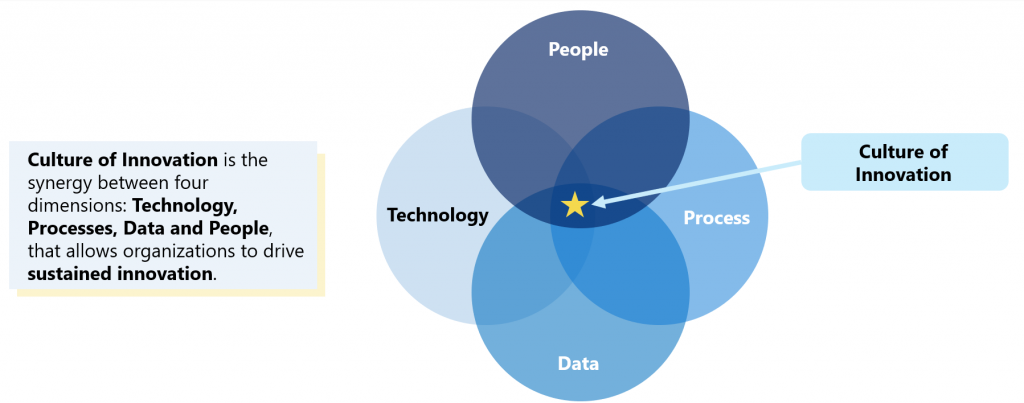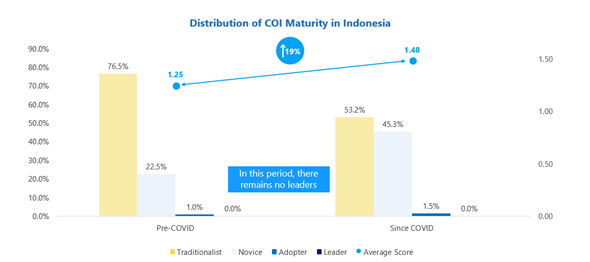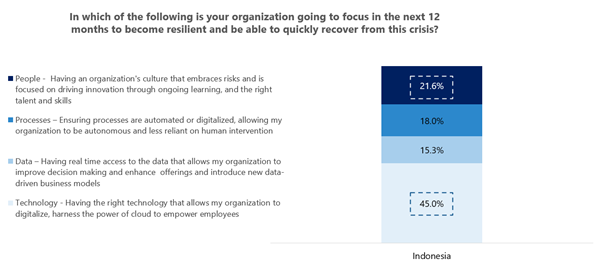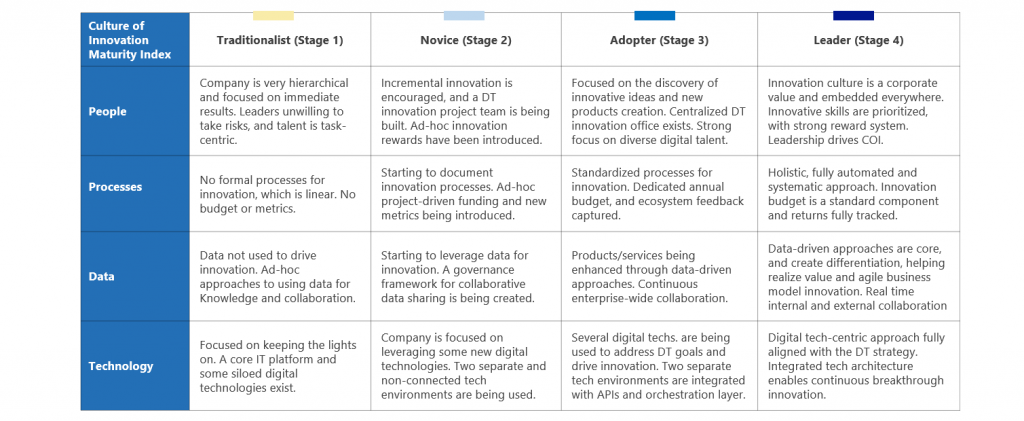The COVID-19 pandemic has shown that no business is 100 percent resilient, but an organization that is strengthened by digital technology will become tougher and more capable of transformation when faced with mass structural change. This is one of the findings of a Microsoft-IDC study regarding the “Culture of Innovation”, which was released on the sidelines of the Microsoft Cloud Innovation Summit (MCIS), which was held virtually with the theme “The Digital Path to Business Resilience with Hybrid Cloud.”
Digital transformation is becoming more urgent than ever. Even organizations that have come a long way on their digital transformation journey before the pandemic must move faster. Not just for transformation, but for increasing agility, speed to market, and stability.
“Organizations in Indonesia have realized how much their ability to innovate fuels their performance and business resilience during the crisis. Since COVID-19, 61% of organizations in Indonesia, similar to leaders across Asia Pacific (64%), have found innovation to be easier. This demonstrates how firms in Indonesia are embracing a culture of innovation to become more mature and accelerate their transformation” explained Daniel-Zoe Jimenez, Associate Vice President (AVP), Head of Digital Transformation (DX), IDC Asia/Pacific.
These findings were released by Microsoft in its latest study with IDC Asia Pacific which surveyed 213 business decision makers and 234 workers in Indonesia within a 6-month period, before and since COVID-19. The Indonesia study was part of a broader survey among 3,312 business decision makers and 3,495 workers across 15 markets in Asia Pacific conducted over the same time-period. Titled “Culture of Innovation: Foundation for business resilience and economic recovery in Asia Pacific”, it uncovered how organizations can successfully fuel business resilience and performance through innovation.
Furthermore, over 7 in 10 (74%) of organizations in Indonesia are speeding up digitalization to adapt to the new reality – from launching digital products and introducing digital payments to embracing ecommerce and automation; this is compared to 87% of leaders2 who will do the same.
“Innovation is no longer an option, but a necessity. We’ve seen how the recent crisis spurred transformation across the region, and organizations will have to integrate the ability to innovate into their core, to recover,” said Haris Izmee, President Director, Microsoft Indonesia. “We originally commissioned this research to gain better insight around the relationship between having a culture of innovation and an organization’s growth. But now, more than achieving growth, we see that having a mature culture of innovation translates to resilience and strength to withstand economic crises and recover.”
The study introduced the culture of innovation framework, which captures organizations’ approach to innovation. Through the research, organizations’ maturity was mapped against four dimensions – people, processes, data and technology. As a result, organizations were grouped in four stages – traditionalist (stage 1), novice (stage 2), adaptor (stage 3) and leaders (stage 4). Leaders comprise of organizations that are the most mature in building a culture of innovation[1].
Fig 1: Culture of Innovation Framework
The study found that in the span of six months, organizations in Indonesia have matured in a culture of innovation by 19%, an indication that they have increased their ability to innovate. In comparison, organizations in Asia Pacific saw an 11% growth in culture of innovation maturity.
People and technology were found to be the weakest dimensions of the culture of innovation framework for organizations in Indonesia. When asked about their priorities for the next 12 months, they indicated that they will prioritize these same areas of people (22%) and technology (45%) as the most essential for business resilience and recovery.
“It is encouraging to see business leaders in Indonesia recognize that focus on people and culture, in addition to technology, is crucial to drive sustained innovation and realize the digital transformation ambition” continues Haris Izmee. “Achieving success in digital transformation requires both the adoption of tools and technologies as well as own people’s capabilities – what we term as tech intensity – a critical component of the culture of innovation.”
In line with its mission to empower every person and every organization on the planet to achieve more, the Microsoft Cloud Innovation Summit 2020 presented business leaders from Indonesian leading companies such as Angkasa Pura I, Astra International, Bank Mandiri, Bluebird, Bukalapak, the Indonesia Stock Exchange, JNE, Kalbe Farma, Kino, Pertamina, SOHO, XL Axiata, industry associations, and Microsoft partners to discuss the importance of a culture of innovation to drive business resilience and economic recovery after the COVID-19 pandemic.
-End-
APPENDIX: The Culture of Innovation Study
Background
Microsoft and IDC Asia/Pacific have collaborated to assess organizations’ ability to innovate and how it strengthens their business resilience and better performance, including faster recovery.
The study explores in more details how organizations who display a Culture of Innovation (comprising the aspects of People, Process, Data and Technology) transform and redefine their business, are more resilient and recover faster from challenges.
Objective
Our goal is to share the learning from them and best practices so others can benefit from that and progress in their ability to drive sustained innovation to better adapt and transform.
Framework
The study introduced the culture of innovation framework, which captures organizations’ approach to innovation. Through the research, organizations’ maturity was mapped against four dimensions – people, processes, data and technology. As a result, organizations were grouped in four stages – traditionalist (stage 1), novice (stage 2), adaptor (stage 3) and leaders (stage 4). Leaders comprise of organizations that are the most mature in building a culture of innovation[1].
Fig 1: Culture of Innovation Framework
Method
- The study was conducted in two phases – Phase 1 (Pre-COVID; Dec 2019-Jan 2020) and Phase 2 (Since COVID-19; July 2020). Phase 1 – 1,622 business leaders and 1,823 workers (102 business leaders and 120 workers in Indonesia) participated; Phase 2 – 1,690 business leaders and 1,672 workers (111 business leaders and 114 workers in Indonesia) participated. Participants from organizations with more than 250 staff were polled.
- 15 Asia Pacific markets were involved in the study: Australia, China, Hong Kong, Indonesia, India, Japan, Korea, Malaysia, Philippines, New Zealand, Singapore, Sri Lanka, Taiwan, Thailand, and Vietnam.
- Leaders, or leading organizations, comprise 8% of all organizations surveyed – they fall into the most mature stage (Stage 4) of the culture of innovation model comprising the areas of people, process, data and technology.
Result (Indonesia)
Culture of Innovation: Foundation for business resilience and economic recovery in Asia Pacific
Report demonstrates that innovation has become a necessity and organizations across Asia Pacific have embraced it to respond to the challenges imposed by the crisis and reimagine themselves for the future.
- 84% of business decision-makers in Indonesia say innovation is a ‘must’, not just good-to-have; they see the ability to innovate as vital to performance and resilience, according to a new Microsoft-IDC study.
- Despite a lower maturity score than the region, Indonesia organizations have advanced in a culture of innovation by 19% during COVID-19, exceeding the growth rate of Asia Pacific businesses (11%).
- 74% of organizations in Indonesia are accelerating the pace of digitalization in response to the crisis, compared with 87% of leaders in Asia Pacific.
- Almost all (98%) leaders from Asia Pacific with the most advanced culture of innovation believe that innovation is key to responding quickly to market challenges and opportunities; they are more resilient to crises like the current pandemic, and expect to recover faster.
- 21% more leaders, compared to Indonesian organizations, expect to grow revenue in 2020.
- 1 in 3 leaders expect to increase their market share despite the pandemic.
- 45% of leaders believe that their organizations will recover from the COVID-19 crisis in six months or less.
Organizational maturity for culture of innovation in Indonesia
Fig 2: Growth in Culture of Innovation Maturity in Indonesia (%)
While no organizations fall within the category of leader in Indonesia, there has been substantial growth of organizations that shifted out from the traditionalist stage (77% down to 53%), and who went into the novice stage (23% up to 45%) – demonstrating that they are maturing. While this is a very positive trend, still majority of organizations in Indonesia are at early stages of maturity in culture of innovation and there is no representation of the most advanced leaders.
Demonstrating their stronger propensity for resilience and adaptability, 21% more leaders in Asia Pacific, as compared with organizations in Indonesia, expect an increase in their revenue and one in three of them expect to increase their market share despite the crisis.
The study also revealed that while significantly more organizations in Indonesia found innovation to be hard (75%) compared with Asia Pacific leaders (68%) before COVID-19, they have since changed perceptions with significantly less Indonesia organizations (39%) and leaders (36%) having this sentiment now. This is because they were forced to accelerate innovation in response to the disruptions in the market.
Focus on people and technology in Indonesia
People and technology were found to be the weakest dimensions of the culture of innovation framework for organizations in Indonesia. When asked about their priorities for the next 12 months, they indicated that they will prioritize these same areas of people (22%) and technology (45%) as the most essential for business resilience and recovery.
Fig 3: Technology and People as the two focus areas for organizations in Indonesia (%)
Recommendation
Culture of innovation – a success formula for resilience and faster economic recovery
Using the culture of innovation framework, the study revealed the best practices that organizations can adopt to progress across people, technology, data and process.
Specifically, organizations are encouraged to:
- Fortify resilience with technology – Strengthen the organization’s approach to digital transformation through resilient technologies allowing simplification, flexibility and agility – cloud, artificial intelligence and machine learning. At the same time, ensure that cybersecurity is infused into the organization’s digital footprint.
- Invest in people’s capabilities and skills – Create open and inclusive environment to attract the best and diverse talent. Integrate workplace innovation efforts that will be crucial to accelerate transformation, ensuring the right rewards and incentives to encourage innovation and upskilling to sustain the pace of innovation, by unlocking people’s capabilities.
- Leverage data to increase competitiveness – Capitalize on the value of data through developing new data-driven products and services and revenue streams for organization’s competitiveness. It will be key that data-driven insights are leveraged for enterprise-wide collaboration and decision-making to institute a knowledge sharing culture.
- Redesign processes to empower people to continuously drive innovation – Create a systematic approach to drive innovation – from ideation to commercialization and establish a centralized digital transformation budget, along with digital KPIs. Customer centricity should be at the heart of continuous improvements, and a feedback loop is necessary to capture learnings on an ongoing basis.
Please refer to Appendix for full framework
Appendix: Stages of Culture of Innovation
About Microsoft
Microsoft (Nasdaq “MSFT” @microsoft) enables digital transformation for the era of an intelligent cloud and an intelligent edge. Its mission is to empower every person and every organization on the planet to achieve more.
For more questions and information, please contact:
| Microsoft Indonesia
Vishnu Mahmud |
Makna agency
Aldila Mandalika |





